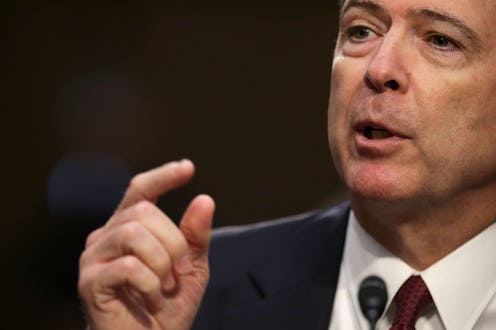News
Comey Reveals What Influenced His 2016 Decision To Investigate Hillary Clinton — Again

James Comey's upcoming book, A Higher Loyalty: Truth, Lies, and Leadership, is filled with newsworthy details that go beyond its insults to President Trump (though it's heavy on those, too). The former FBI director also discusses his decision to tell the public that he would reopen an investigation into Hillary Clinton's emails just before the 2016 election. In his memoir, Comey admits he may have been influenced by opinion polls when he made the announcement — meaning that he wasn't necessarily acting objectively.
"It is entirely possible that, because I was making decisions in an environment where Hillary Clinton was sure to be the next president, my concern about making her an illegitimate president by concealing the restarted investigation bore greater weight than it would have if the election appeared closer or if Donald Trump were ahead in all polls," Comey reportedly writes. "But I don't know."
It's a frustrating admission for those who hoped that Comey's decision had been uninfluenced by partisan bias. Assuming that he was influenced by the polls, some could argue that his confidence in Clinton's win helped lead to her loss.
On Oct. 28, 2016 — less than two weeks before the election on Nov. 8 — Comey wrote a memo informing Congress that he had received a batch of emails that "appear to be pertinent to the investigation" into Clinton's use of a private email server for classified information. Nine days later, he clarified that these emails weren't new and held no incriminating information.
Some analysts argue that Comey's original announcement turned some wavering voters toward Trump and encouraged others to avoid the booth on Election Day, shifting the Electoral College vote slightly in his favor.
Comey justified his decision at the time by arguing that he had an "obligation" to update the public because he had already announced that the investigation was complete. However, he also noted that his move was unusual, saying that "we do not ordinarily tell Congress about ongoing investigations." Last May, he said he'd believed that "concealing" the development from the public would have been "catastrophic."
But some people believe that Comey was motivated more by self-interest than a detached commitment to do right by the public. He didn't want to appear partisan, these analysts argue, and he believed that he'd be accused of bias when people eventually learned that the FBI had reopened the investigation in secret. As Vanity Fair reports, "sources close to Comey insist that ... his decision to go into more detail was influenced by his desire to make people believe the process had been fair," and wanting to appear fair himself.
It now appears that even Comey has doubts about his motivations, since he writes that it is "entirely possible" that he was influenced by the polls and political concerns.
It feels a bit ridiculous to be rehashing Comey's decision 18 months later. But the public still has a great appetite for doing so, in part because liberals remain anxious to find scapegoats to blame for Trump's win.
Then again, Comey does deserve some blame: Opinion polls did shift against Clinton after his announcement, and 24 million people submitted early votes in the nine days between his memo and subsequent clarification that the latest emails did not warrant criminal charges.
FiveThirtyEight's Nate Silver has argued that Comey's decision to reopen the investigation — which, even though it was undoubtedly not the biggest factor that hurt Hillary Clinton's campaign, is more easily quantified than others, he says — is responsible for her loss because it moved public opinion away from her by between 1 and 4 percentage points. "Clinton lost Michigan, Pennsylvania and Wisconsin by less than 1 percentage point, and those states were enough to cost her the election," he notes.
Clinton agrees. "If the election had been on October 27, I would be your president," she told Christiane Amanpour in a CNN interview last May.
Comey doesn't want to believe that he might have contributed to Trump's win, but admits that he might have done so. "It makes me mildly nauseous to think that we might have had some impact on the election," he told the Senate Judiciary Committee last May, but added that "honestly, it wouldn't change the decision" that he made.